- Home
- Stephen Hunt
Jack Cloudie j-5 Page 21
Jack Cloudie j-5 Read online
Page 21
Boulous felt the cold metal of the diary keeper’s pistol jamming into his neck before he could even turn around. ‘What have you done, Boulous, and why in heaven’s hundred names did you come back here? You should have run, you two treacherous devils. You should have run.’
Boulous watched hopelessly as Omar struggled in the grip of the two burly guardsmen as they laid into him. ‘Yes, I believe we should have.’
Nuance and subtlety. Omar had barely understood how the game inside the Jahan was played. But the grand vizier does.
Omar could feel the blood running down his face as he regained consciousness. The painful swelling around his eyes blurred the sight of Boulous sprinkling him with dirty water from a puddle. Then he remembered the questions being fired at him, over and over again. Why did you kill the grand marshal? Who paid you to join the guardsmen? Which satrapy was he working for, which client state within the empire? Had the grand marshal of the order accused Omar of the crime of murdering one of the grand vizier’s servants, before Omar killed him to silence the old man? Had he and Boulous been plotting treachery with the grand marshal? Had they been trying to force Shadisa to put poison in the grand vizier’s food, or were they trying to assassinate the Caliph Eternal through the grand vizier’s office? Why had Omar killed the slave girl? When had he murdered her? Where was Farris Uddin hiding?
No sleep; lights, being drowned over and over again in a foul-smelling cistern. At least the physical pain distracted him from thinking of Shadisa’s blood-soaked clothes being destroyed by Salwa, of what her last few minutes must have been like at the dog’s murdering hands. He tried not to sob at the thought. Omar had been kept on his own for what seemed like weeks, but here he was — back with Boulous at last. They would escape together, and he would have his revenge on that savage Salwa and his dark-hearted master, the wretched grand vizier. Revenge, that was all the last son of Barir had been left as his legacy. Fate had taken Shadisa from him as a reminder of that.
‘It’s raining,’ spluttered Omar, watching rivulets running down the firing slit into their prison cell, darkness and a lashing wind outside.
‘This is not the rain season, it is an omen,’ said Boulous.
‘Good or bad?’ asked Omar, sitting up and feeling the bite of his empty stomach, before trying to rub the agony out of his temples. ‘What a headache.’
‘It is the drugs they injected into your neck,’ said Boulous.
‘Truth drugs?’
‘The sort that will make you agree with anything your interrogators suggest to you,’ said Boulous.
‘I will not have told them anything. My mind is too strong for them.’
‘It hardly matters,’ said Boulous. ‘The pain was to break us, to make us tell them what we knew; and all they found out was that we knew nothing. They are not interested in the truth now, if they ever were. Some of the ones questioning us were from the Sect of Razat.’
‘I did not murder the grand marshal,’ insisted Omar, as if it was the retainer he had to convince.
‘Nor I,’ said Boulous. ‘There are assassins that are said to serve the Caliph Eternal. It is whispered that their flesh has been changed by the womb mages so they can alter the features of their bodies and faces at will. Such creatures murdered the grand marshal, although I have no doubt it is traces of your blood the womb mages will have found on the sword sticking out of the grand marshal’s chest.’
Omar moaned in despair. ‘Immed Zahharl, this is his doing.’
‘Now he has everything he wants,’ said Boulous. ‘A war to consolidate his hold on the empire, the whiff of booty and glory to buy the loyalty of the last of the admirals and generals who opposed him, and for the coup de grace, the grand marshal cut to pieces and unable to oppose his ambitions.’
‘Not quite everything, jahani,’ said a voice through the bars of their prison cell.
Omar threw his aching body towards the door in fury. ‘Salwa, you filthy murdering cur!’
The man indicated the insignia on his shiny new guardsman’s uniform in amusement. ‘You are still a guardsman, at least in name. Do you have no salute for your order’s new grand marshal?’
‘Come through this door and I’ll carve you up like you did Shadisa!’
Salwa smiled sadly. ‘I did you a favour, guardsman. The silly girl’s beauty would have faded in the end and where would your lusts have wandered then? I’ve saved you the heartache of growing apart as she slowly became a crone, the expense of acquiring and feeding younger wives.’
Omar gripped the bars on the door so tight his knuckles went white. ‘I will repay your favour in kind, you filthy murdering dog.’
‘We must all prove our allegiance,’ said Salwa. ‘You have proven where your loyalties lie. You have chosen the past.’
‘How many men did you murder from Haffa?’ demanded Omar.
‘Heretics,’ said Salwa. ‘They were declared without Cent. I made their end painless. A silk rope to twist around their necks. They lost consciousness long before they died. I am not a cruel man, Omar Barir. My nature is merciful. I did not invent the rules of the game in the palace, but even you must admit I play them better than you. You cannot bleat about it after you have lost.’
‘You have no honour,’ said Boulous.
‘Perhaps I can afford none.’ There was a rattle at the lock as the cell door was opened. ‘You know what the laws of the imperial guardsmen demand from traitors to the order?’
‘Tied to a pair of draks,’ said Boulous, ‘and torn apart.’
‘One drak for your hands, one drak for your legs,’ said Salwa. There were six men waiting in the passage for them with rifles. Not guardsmen, but marines in the new black and silver uniforms of the Imperial Aerial Squadron.
‘A merciful man,’ spat Omar as the sailors dragged him and Boulous out and pushed them down the corridors of the fortress.
‘In this instance, the grand vizier asked that your ancient traditions be honoured,’ said Salwa, almost sounding as if he felt genuine regret at their fate. ‘But I will instruct one of my airship officers to put a ball through your brain before the pain grows too intense.’
They emerged onto an open parapet, the lashing rain whipping across the top of the fortress, the coloured lights of the palace dome shining from below like luminescent fish beneath the glowing sea, and in the air above them a squadron of airships escorting in the strangest-looking aerostat Omar had ever seen, metal-clad, her armour sparkling in the lightning dancing around her hull.
‘A Jackelian ship,’ said Salwa. ‘The Iron Partridge. Admiralty flagged, a magnificent prize. We captured her without a shot being fired. The vice-admiral commanding her was a coward.’
‘They will not all be so,’ coughed Boulous in the cold rain. ‘The guardsmen have flown into action against the infidel’s airships often enough to tell you that.’
‘Times are changing,’ laughed Salwa. ‘Locked in the cells you won’t have heard the news. We destroyed more than a quarter of the Kingdom of Jackals’ combined fleet in a single action. You know how many airships the empire lost? None, not a single vessel. The Imperial Aerial Squadron is already back rearming with supplies and ordnance. When we fly north a second time, we will bring the empire such a victory as your friends in the order have only dreamt of. Your kind is no longer relevant, little jahani. You are fading into history.’
As Omar and Boulous were pushed forward on the parapet, Omar saw that hundreds of guardsmen were lined up in the courtyard below, their leather armour shining in the rain and the lightning.
Salwa looked back towards Omar as he mounted a firing step on the battlements. ‘I am not a cruel man, last son of Barir, but I fear necessity has made the grand vizier otherwise. He commanded that you see this and told me to inform you that this is what the march of history looks like.’ Salwa turned towards the ranks of guardsmen assembled below. While he was speaking, Omar and Boulous were shoved down to the stone and spread out, their arms and legs tied with thick rope to two pa
irs of training draks, the large flying creatures jostling the troops holding their reins, spooked by the squall. The draks were never normally expected to fly in such dirty weather.
‘Two days ago,’ Salwa shouted down, ‘I asked for riders to volunteer to join the Imperial Aerial Squadron as scouts — and I see before me the answer to my request. A regiment of cowards who would rather patrol the safe gardens of the Jahan than throw themselves into action alongside the fleet.’
Hisses of outrage rose up from the courtyard in answer.
‘I am your grand marshal, you dogs!’ Salwa roared at them.
Calls echoed back. ‘You wear his corpse’s cloak.’
‘Send us into battle as guardsmen, not navy lapdogs.’
‘We don’t send traitors into battle,’ Salwa yelled down. ‘Before he died, the previous grand marshal was uncovered plotting treason against the empire. These two-’ he waved dismissively at Omar and Boulous, ‘-were leaders in his plot, leaders who tried to save their necks by silencing the grand marshal when they realized that the Caliph Eternal had uncovered their treachery. By your act of cowardice in refusing to fight, you have raised your colours along their side. The order of the imperial guardsmen is therefore disbanded. By command of the Caliph Eternal, emperor of emperors, your regiment is declared heretic!’ As his hand dropped, marines of the Imperial Aerial Squadron rose up from behind the parapets of the fortress, rifles pulled tight against their shoulders, and there was a horrendous crackling as if a hundred blocks of oak were splintering. Smoke drifted out across the sky as guardsmen screamed below, scattering and falling and dying, rifle balls buzzing like bees in the air.
Omar screamed in rage at the betrayal, Boulous struggling by his side, even as his legs began to be drawn taut, the drak at the other end of the parapet struggling against the sailors holding it, driven to take flight and seek combat by the sounds and sights of the slaughter occurring below.
‘The grand vizier wished for you to see the end of the guardsmen,’ Salwa said to Omar. ‘And he instructed me to make you this offer. Renounce the order now; join the Imperial Aerial Squadron as an officer. Act as an example that even the grand vizier’s most implacable enemies may prosper through shifting their loyalties away from the past and embracing the future and our glorious sect in the name of progress.’
Omar gritted his teeth and silently shook his head.
‘I was told you were a lazy fool who would always choose the easy way,’ said Salwa. ‘Choose the easy way, guardsman. Do it.’
‘There isn’t a drak in the fortress strong enough to pull my legs out of their sockets.’
Salwa shook his head sadly and motioned a sailor forward, raising his rifle towards Omar’s head. ‘Well, at least the foolish part is true. Being on the wrong side of history brings with it a savage burden. One it seems you must carry to your grave …’
CHAPTER ELEVEN
Jack rubbed his brow, half covered by a turban and sweating in the arc of the high sun. The relative ease with which the four of them had transformed themselves into citizens of the empire still seemed inconceivable to him. The skins of the three men had been darkened by dyes which the first lieutenant, with her half-Cassarabian parentage, hadn’t needed. They wore the local clothing that Westwick had pulled out of her supply crate, the lining along the hems of their robes sewn with silver coins stamped with the caliph’s head — legal tender throughout the empire. But then, the empire — as the commodore had explained — wasn’t a homogenous nation, but rather a civilization composed of disparate nations, all ruled, however unwillingly, by the Caliph Eternal.
Jack did as he was told and repeated whenever he needed to the fiction that he was a slave from the sultanate of Zahyan, loyal servant to the commodore’s spice merchant and his new wife, just married to seal a trading alliance, and travelling with their mute colossus of a bodyguard — the contents of his two flasks now hidden beneath his robes.
Having crossed the desert the locals called the Empty Quarter, in their pocket airship, they had deflated the stolen aerostat and hidden the open boat-like gondola under the cliff of a gorge in the wilds. They had landed a couple of miles outside a small village that the commodore entered before returning with four camels tied together. He had been muttering about parting with good money for the rangy, flea-bitten, bad-tempered creatures, and after a few days on the road with them, Jack came to see why. Jack’s camel was always grumbling; deep-throated complaints at being mounted, dismounted, ridden too close to the other camels, or just protesting against every flick of the rider’s crop needed to keep the beast pitching forward.
Along with their reluctant steeds, the commodore led them into the hill town of Sharmata Sarl in the south-western corner of central Cassarabia, a couple of days travel from the coastal towns where the royalist fleet-in-exile had docked in his younger days. It was a trading hub for the various caravan roads that crossed the empire, a place where the people that the four of them were impersonating should feel at home — and more importantly, where some of the commodore’s old contacts were located.
The commodore had used the spare time travelling to Sharmata Sarl to drill Jack and Henry Tempest in the mannerisms of the locals. Jack found there was as much to learn as there had been when the airship’s officers had been tutoring them back on board the Iron Partridge. Firstly, there were all the little things, such as how locals would usually refer to the country as the empire, never as Cassarabia; how the caliph was never just the caliph when you talked of him, but the Caliph Eternal. And then there were the bigger things — matters completely alien to the mindset of a Kingdom-born man — such as how locals would always bow when a priest of one of the hundred sects of the Holy Cent passed, and the hours of the day when they were required to supplicate themselves for at least ten minutes if they passed under the shadow of a temple.
‘It’s the small actions that will give you away,’ the commodore had warned, ‘never the large.’
Small actions such as the need to fake indifference towards biologicks, the bizarre breedings of the empire’s womb mages.
‘It might be considered bad form in the Kingdom to have your body reshaped by a womb mage, but here in the empire it is a matter of blessed survival,’ noted the commodore. ‘Nomads with water-filled humps on their backs to see them through a dried-up oasis or two, or transparent eyelids so they can travel through wicked sandstorms without going blind.’
And there were enough of the twisted creatures tied up against the white-walled buildings of Sharmata Sarl. Caterpillar-like things as tall as a shire horse but seven times the length; carts pulled by pairs of sharp-beaked birds with human eyes, caravans guarded by gold-masked warriors with tails swishing behind them. ‘Nothing like growing out your prehensile tail for balance,’ explained the commodore. All the great scimitar masters should have one. It was, he explained, considered bad art to blend too much human flesh with the panoply of creatures whose templates the sorcerers borrowed from, although biologicks with human flesh were the easiest to be birthed by the swollen-bellied slaves who acted as the empire’s living factories.
‘I’ve never heard of this Cantara woman,’ said Westwick, looking at the door of the house that the commodore had led them to.
There had been camels stabled lower down in the town. Narrow, tall streets, steeped in shade now hemmed them in, while laundered items of clothing swayed on lines close to their heads. Further up the hilly incline, a group of old men played draughts in the street while thin hounds lay by their feet, noses laid out across the dusty white cobbles.
‘Ah, and that’s as it should be, Maya,’ said the commodore, his hand lifting a knocker shaped like a bat on the door. ‘Your dour friends in the State Protection Board are fine for winkling out the caliph’s agents hiding on Jackelian soil, but here in the empire the great game is played by the Pasdaran’s rules. Or at least, that’s how it used to be, back in the day.’
An old hook-nosed woman wearing a silk head-covering opened the doo
r, her eyes widening in surprise at the sight of the commodore and the other three disguised Jackelians. ‘I see an old soul wearing the face of a young man I once knew.’
The commodore’s head bobbed knowingly. ‘Still in the house, Cantara, after all this time.’
‘It’s not easy to leave the house,’ said the woman. ‘As you must have noticed, the neighbourhood is quite different from the old days. Come in, come in you old rascal, come in for some yoghurt and sherbet.’
Jack walked in after the commodore, followed by the hulking captain of marines and First Lieutenant Westwick, her eyes surveying the street suspiciously for any sign that their entry had been watched.
‘Are your companions also tradesmen?’ said the old woman to the commodore, ushering them into a wide, awning-covered courtyard and bidding them to sink onto the cushions placed around a rectangular pool in its centre.
‘Of sorts, Cantara,’ said the commodore. ‘Tradesmen of sorts with the rival firm, whose wicked employ, I have to admit, has finally found my old bones too.’
The old woman nodded, humming thoughtfully. ‘Not so like the old days after all, then. You have heard from afar, I suppose, about how poorly our house has fared of late.’
‘Many of your servants have scattered?’ said Westwick.
‘Most have passed away,’ said the old woman. ‘Very sad, very sudden.’
‘Say it’s not all of them, lass,’ said the commodore. ‘I have travelled a blessed long way for a reunion. A few faces from the past to chew the fat with, that’s not much to ask for now, is it?’
‘There’s a few left,’ admitted the old woman. ‘Mostly in service with the neighbours, you understand.’

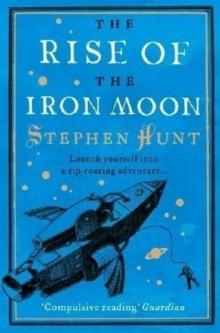 The Rise of the Iron Moon
The Rise of the Iron Moon Empty Between the Stars (The Songs of Old Sol Book 1)
Empty Between the Stars (The Songs of Old Sol Book 1)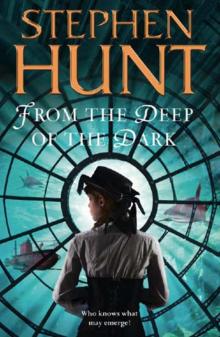 From the Deep of the Dark
From the Deep of the Dark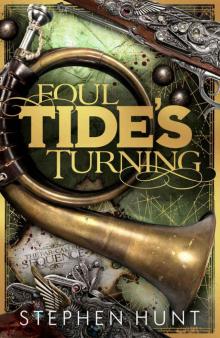 Foul Tide's Turning
Foul Tide's Turning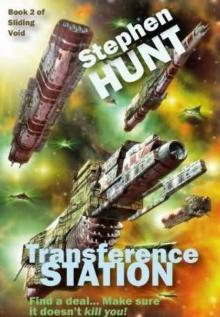 Transference Station
Transference Station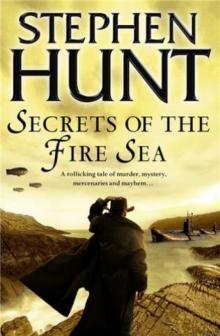 Secrets of the Fire Sea j-4
Secrets of the Fire Sea j-4 Void All The Way Down: The Sliding Void Omnibus
Void All The Way Down: The Sliding Void Omnibus The Kingdom Beyond the Waves j-2
The Kingdom Beyond the Waves j-2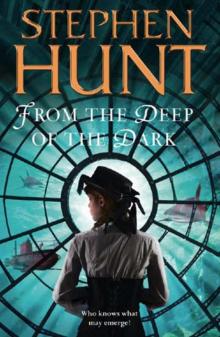 From the Deep of the Dark j-6
From the Deep of the Dark j-6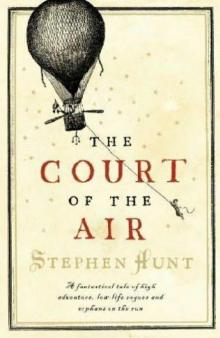 The Court of the Air
The Court of the Air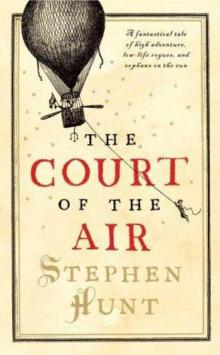 The Court of the Air j-1
The Court of the Air j-1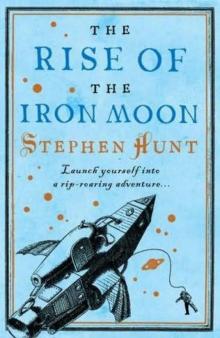 The rise of the Iron Moon j-3
The rise of the Iron Moon j-3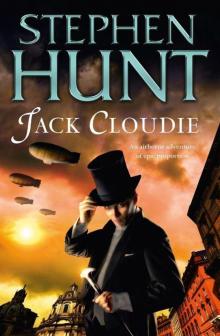 Jack Cloudie j-5
Jack Cloudie j-5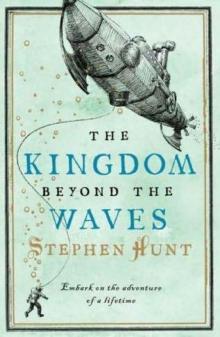 The Kingdom Beyond the Waves
The Kingdom Beyond the Waves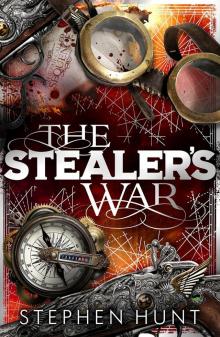 The Stealers' War
The Stealers' War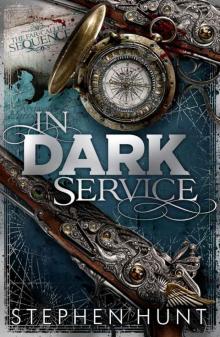 In Dark Service
In Dark Service